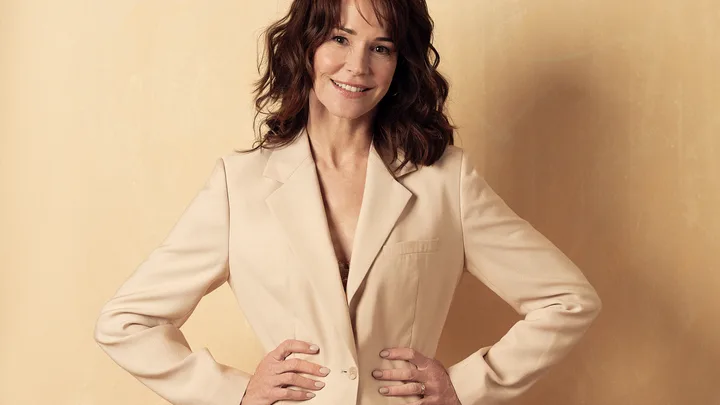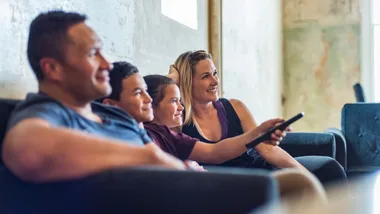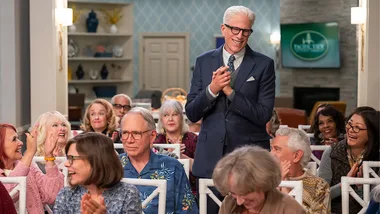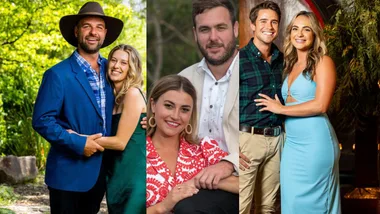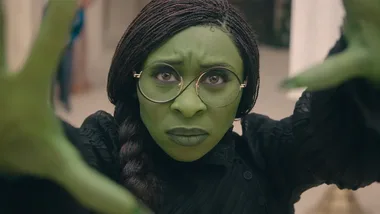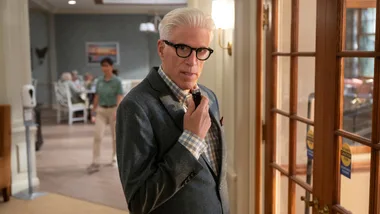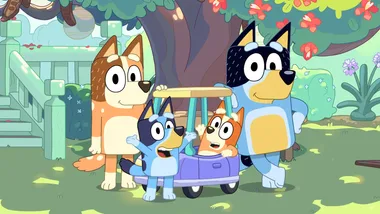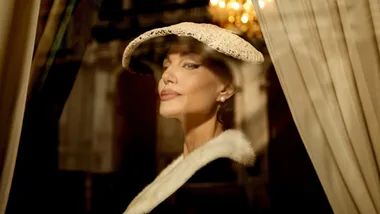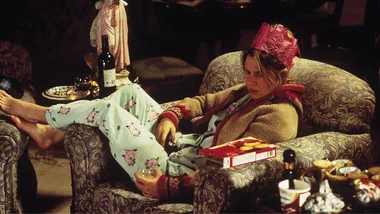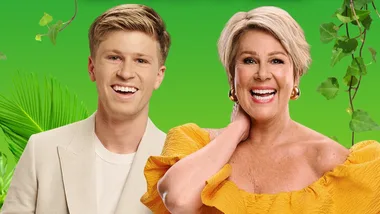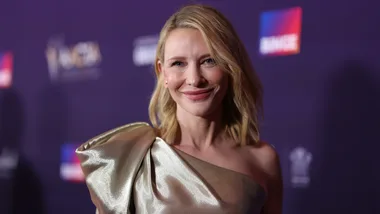Frances O’Connor doesn’t sound like a famous person. Speaking from her home in London, the actor, writer and director is softly spoken, laughs often and gives thoughtful answers to questions about fame, creativity and coming home. “I don’t know, what do you think?” she asks at one point when musing over the feminist spirit of her favourite literary heroines.
Speaking with an English-Australian accent, she offers none of the canned answers so common in conversations with stars who’ve been giving interviews for 20 years. Perhaps this is because, as a self-described introvert, she prefers to be slightly out of the spotlight. That hasn’t always been easy, with hit TV shows, major film roles, Golden Globe nominations and a recent directorial debut. But she loves to tell stories, and as she enters a new era of her working life she’s relishing taking control behind the camera while pursuing new challenges in front of it. “It made me appreciative,” she says of the 2022 film, Emily, which she wrote and directed. “It also made me think that I love telling my own story and want to do more. Well, I am. Directing is just another way of expressing myself. I’m really excited about that.”

Starring in The Twelve
Frances recently returned home to Western Australia to film season two of courtroom drama The Twelve. She plays defence barrister Meredith Nelson-Moore opposite an incorrigibly confident QC, Brett Colby (Sam Neill). Stepping in front of the camera again was a homecoming in more ways than one. Frances grew up outside Perth, having arrived in Australia at the age of two when her parents returned from England. “It’s so nice roaming places I’ve been to in my childhood,” she says about being in WA. “It’s a beautiful part of the world. Getting to spend that time with my family, especially my mum and dad, was amazing. My parents would come on set and have a look.”
Apart from an appearance in the SBS series Erotic Stories, this was Frances’ first role since taking on the challenge of Emily. “It felt so easy,” she says. “But difficult in a different way. What was lovely was having a holiday from the responsibility. If you’ve written and you’re directing it, the buck stops with you. But when you’re part of an ensemble, there’s a sense of freedom …
“I’ve been in the industry a long time, you don’t realise the amount of stress that’s on the other side [of the camera] in terms of schedules, lighting, budget and all that stuff that, as an actor, people shield you from because they just want you to perform.”

A family affair
The production team behind The Twelve prides itself on creating an authentic atmosphere, and to that end the court scenes are filmed “like it’s really happening”, Frances says. “It was pretty terrifying.”
Also appearing in The Twelve is her husband, Gerald Lepkowski, of Game of Thrones and The Death of Stalin fame. “They said, ‘Would you come and play Frances’ husband?’ He was
so pleased to do the gig. He’s so good too,” she adds with a delighted laugh. Gerald and Frances are each other’s biggest champions but it’s the first time they’ve appeared on-screen together.
“Our marriage is a little rocky in the show. We get on so well, so it was fun to play that out. It was lovely to do some acting with Gerald after all this time,” Frances says.
Scottish-born Gerald was a dock worker in Glasgow before ennui and a hankering for the theatre drew him to the Western Australian Academy of Performing Arts (WAAPA) where Frances also studied. They appeared together as part of a Melbourne Theatre Company (MTC) ensemble that also featured Geoffrey Rush and Helen Thomson.
“We haven’t acted together since then,” Frances says, “which we just realised when we were doing it. There’s something really lovely about that.”
They married in 2011 but have been together since their early twenties, and have a son, Luka.

A star is born
From WAAPA and the MTC, Frances did time in Mount Thomas, appearing in a few episodes of Blue Heelers. She picked up a part in G.P. before scoring a succession of film roles that would change her life.
First was Love and Other Catastrophes, with Radha Mitchell as her on-screen girlfriend. Shot at The University of Melbourne in 17 days on a budget of about $250,000, the film would become a cult classic and critical hit. The romantic road movie Kiss or Kill, alongside Matt Day, and Thank God He Met Lizzie, starring opposite a young Richard Roxburgh and Cate Blanchett, quickly followed.
The triptych of Australian films vaulted Frances onto the international stage and she was seen next as Fanny Price, the starring role in Jane Austen’s Mansfield Park. In the years that followed she was serenaded by Colin Firth in Oscar Wilde’s The Importance of Being Earnest and she bewitched Brendan Fraser in Bedazzled.
She famously turned down the role of Lady Cora Crawly in Downton Abbey, feeling she was too young for the part (which went to Elizabeth McGovern). She’d already been married on screen to Hugh Bonneville (Lord Grantham) in Madame Bovary, for which she earned her first Golden Globe nomination.

Telling her own story
By the time she earned her second Golden Globe nod, for The Missing in 2015, she was thinking seriously about a story she had long wanted to tell.
Frances, who has a degree in English Literature, had become enthralled by Emily Brontë’s gothic Wuthering Heights, which she read while being shuttled to and from her Catholic high school in WA when she was 15. When Mansfield Park went on hiatus because the director became ill Frances visited Yorkshire, where the Brontë sisters had lived.
Over the years she began slowly drafting a screenplay. There was “such a long list of people” who gave her encouragement, support and constructive feedback on her first draft. Gerald, of course, was her number-one champion. Soon she invited more people to offer feedback.
“There’s something affirming about that. If you take a step into something you want to do creatively, a lot of people will back you … That’s the thing I love about the industry – it’s a community. If you say: ‘Hey, I want to do this’, people really get behind you and they’ll go, ‘Yeah, let me read your script’. Rob Connolly [director of The Dry] was one of the first people who went, ‘Oh, my daughters would love to see this film. Let me help you’.”
A leap of faith
Frances enjoyed the challenge. She sees herself as an actor, not a star, and perhaps now, more a storyteller. She’s never liked the harsh glare of the celebrity spotlight. “For me, it’s always been a struggle,” she says. “I’m at peace with it now and I like how it is at the moment. There were times where I’d get a lot of exposure and I’ve never really been comfortable with it. I love being on a set. I love being on stage, but I find that side of the industry – because I’m an introvert – challenging.
“That’s why it’s nice to balance it with stuff behind the camera too. Some people are really good at it, and I just feel I don’t have that skill set.” Even though she and Gerald haven’t often acted opposite each other, she directed him in Emily. “It was really fun and he was such a support to me while I was making the film as well. We were shooting in the depths of Yorkshire, so we were kind of isolated anyway.”
Filming took place during the pandemic. “We’d been cooped up and suddenly we were out on these wild Yorkshire Dales. I look back at that time of making Emily as very magical.”

A bright future
The film opened at the Toronto Film Festival. For someone who’s never relished publicity, how did Frances cope with the prospect of critical responses to something so personal? “Most artists are pretty sensitive so of course we’re sensitive to how people regard our work,” she says, then quotes American record producer Rick Rubin, whose book about creativity, The Creative Act, she recently read and loved: “Your job is to just make it. Just make the art.”
“You’d never make anything if you were worried about how it’s being perceived. All you have to do is try to make the best work that you can in that moment,” Frances continues. “After that it’s about turning up and doing the work so you can get better at it. You’ve got to be prepared to be in the dust and struggle with what you’re trying to create. It can be messy sometimes. Since I’m older I’ve become better at that, but I’ve still got a way to go.”
Now that she’s successfully seen a film to completion Frances is working on more original projects. She and Gerald are setting up a production company and Frances is eager to work on more projects in Australia. “I’m really keen to tell more stories in Oz,” she says. “It’s my culture that I grew up in, and I want to contribute to the industry and be a part of that …
“People are lovely on Aussie sets. The US is more of a business. On a studio film, it’s more of a job. Whereas in Australia it tends to be personal.
I love that … There is something lovely about the feeling of community.”
